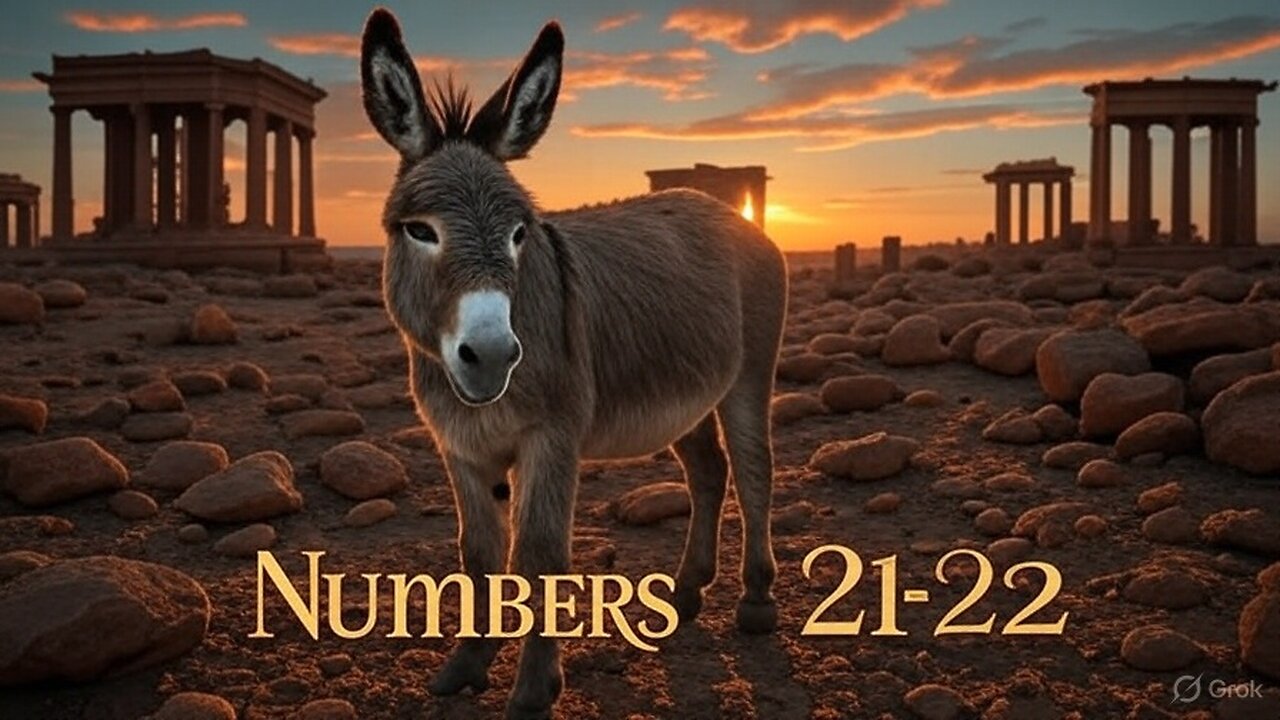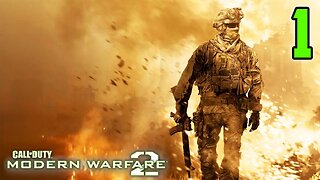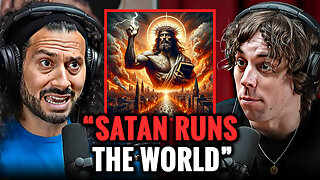Premium Only Content

Numbers 21-22: Canaanites Defeated , Balak Sends For Balaam, Donkey speaks
Numbers Chapter 21: Victories and Trials in the WildernessThis chapter continues the narrative of the Israelites' journey through the wilderness toward the Promised Land, following the death of Aaron. It focuses on themes of complaint, divine punishment, mercy, and military conquests.Conquest of Arad: The chapter opens with the king of Arad in Canaan attacking the Israelites and capturing some of them. The people vow to God that if He grants them victory, they will destroy the Canaanite cities. God listens, and the Israelites defeat Arad, renaming the place Hormah (meaning "destruction").
The Fiery Serpents and the Bronze Serpent: As the Israelites detour around Edom, they grow impatient and complain against God and Moses about the lack of food and water, calling the manna "worthless." In response, God sends venomous snakes ("fiery serpents") among them, biting and killing many. The people repent and ask Moses to intercede. God instructs Moses to make a bronze serpent and mount it on a pole; anyone bitten who looks at it will live. This becomes a symbol of faith and healing (later referenced in the New Testament as a foreshadowing of Jesus' crucifixion).
Journey and Victories: The Israelites continue traveling, stopping at places like Oboth, Iye Abarim, and the Valley of Zered. They sing a song about a well provided by God. They then defeat Sihon, king of the Amorites, after he refuses them passage and attacks. The Israelites capture his cities, including Heshbon, and compose a victory song. Finally, they conquer Og, king of Bashan, taking his land without survivors.
Overall, Chapter 21 highlights God's provision and protection amid the people's recurring faithlessness, setting the stage for their approach to Moab.Numbers Chapter 22: Balak Summons Balaam and the Talking DonkeyThis chapter shifts focus to the threat posed by the Israelites to neighboring nations, introducing the story of Balaam, a non-Israelite prophet, and themes of blessing, cursing, and divine intervention.Balak's Fear and Summons: The Israelites camp in the plains of Moab, east of the Jordan River opposite Jericho. Balak, son of Zippor and king of Moab, fears them due to their recent victories over the Amorites. He sends elders from Moab and Midian to summon Balaam, a diviner from Pethor near the Euphrates River, offering him fees to curse Israel so Moab can defeat them. Balaam consults God, who tells him not to go or curse the blessed people. Balaam refuses the first delegation.
Second Summons and Permission: Balak sends more prestigious princes with greater promises. Balaam again seeks God's will and receives permission to go, but only to say what God commands. Balaam saddles his donkey and departs with the Moabite officials.
The Angel and the Talking Donkey: On the way, God becomes angry (possibly testing Balaam's motives), and the Angel of the Lord blocks the path with a drawn sword. The donkey sees the angel and veers off the road, then squeezes against a wall (crushing Balaam's foot), and finally lies down. Balaam beats the donkey each time. Miraculously, God opens the donkey's mouth, and it speaks, asking why Balaam is beating it. Balaam argues with the donkey, saying it has mocked him. Then, God opens Balaam's eyes to see the angel, who rebukes him for mistreating the animal and explains that the donkey saved his life. Balaam repents and offers to return, but the angel instructs him to proceed and speak only God's words.
Meeting with Balak: Balaam arrives, and Balak takes him to Kiriath Huzoth, where they sacrifice animals. Balak then leads Balaam to Bamoth Baal to view part of the Israelite camp, setting up for the curses in the next chapters.
Chapter 22 emphasizes God's sovereignty over prophets and nations, using humor and miracle (the talking donkey) to underscore that no one can curse whom God has blessed. The story continues into Chapters 23-24 with Balaam's oracles.
-
 30:07
30:07
Degenerate Plays
14 hours agoReverse Captain America! - Call of Duty: Modern Warfare 2 (2009) : Part 1
22 -
 7:56
7:56
Faith Frontline
11 hours agoCIA Spy CONFIRMS Bible Prophecy Is Playing Out Right Now
59 -
 1:25:26
1:25:26
Coin Stories with Natalie Brunell
20 hours agoCan the State Crush Bitcoin? And the Next Big Financial Crisis with Dave Collum
18.6K1 -
 26:38
26:38
DeVory Darkins
1 day ago $6.65 earnedNewsom suffers CRUSHING LOSS after SCOTUS ruling hands Trump HISTORIC WIN
8.32K71 -
 11:23
11:23
Nikko Ortiz
1 day agoArmy Tik Tok Fails Go Hard
66K7 -
 2:27:44
2:27:44
Side Scrollers Podcast
19 hours agoSilksong is “TRANS CODED” + YouTube GASLIGHTS Creators + Asmongold Stops Streaming | Side Scrollers
10.4K19 -
 16:08
16:08
GritsGG
11 hours agoRank 1 Warzone Player VS Stream Snipers & a Cheater!
12K1 -
 1:39:16
1:39:16
The HotSeat
15 hours ago👉 STOP Blaming Each Other — Look at the Media!
27.3K25 -
 22:34
22:34
The Pascal Show
11 hours ago $1.78 earnedFEDERAL CHARGES?! Iryna Zarutska's Attacker Gets Hit With Federal Charges After Fatal Train Attack
12.1K20 -
 LIVE
LIVE
Lofi Girl
2 years agoSynthwave Radio 🌌 - beats to chill/game to
216 watching